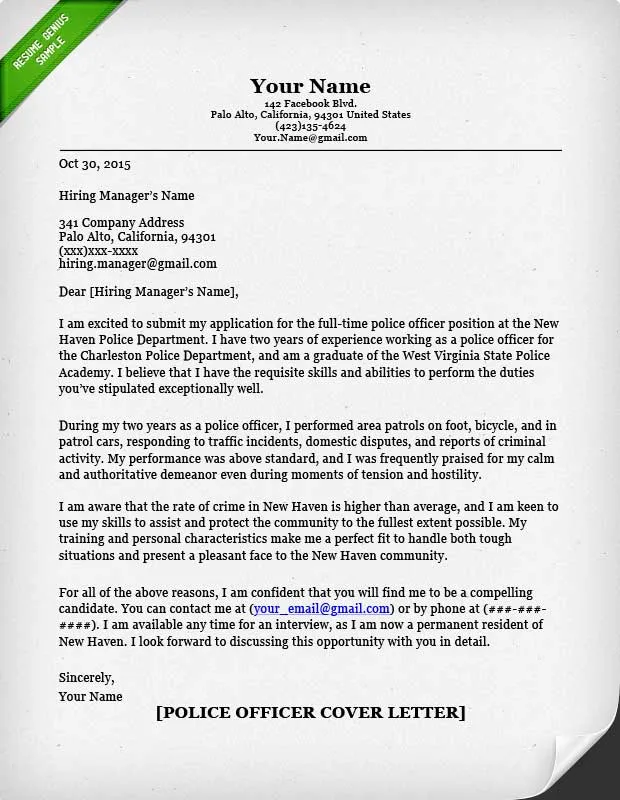Understanding the Police Officer Cover Letter
A police officer cover letter is a crucial document that accompanies your resume when applying for a law enforcement position. It serves as your first direct communication with the hiring manager, providing an opportunity to introduce yourself, highlight your qualifications, and express your enthusiasm for the role. Unlike a resume, which presents a factual summary of your experience and skills, a cover letter allows you to showcase your personality, explain your motivations, and demonstrate why you are a strong candidate for the job. This guide will walk you through every step of crafting a compelling cover letter that grabs the attention of potential employers and sets you apart from other applicants. Successfully navigating the application process, including the cover letter, is essential for making a positive first impression. Creating a well-crafted cover letter is the first step towards securing a position in law enforcement, and it can significantly increase your chances of landing an interview.
Why a Cover Letter Matters
In the competitive field of law enforcement, a well-written cover letter can be the differentiating factor that lands you an interview. It’s your chance to personalize your application and communicate directly with the hiring manager, something a resume simply cannot do. It offers an opportunity to tailor your message to the specific requirements of the job and the values of the police department. It demonstrates professionalism, attention to detail, and a genuine interest in the position, all of which are important qualities for a police officer. The cover letter provides context to your resume, allowing you to elaborate on your skills and experiences, and explain how they align with the needs of the department. By explaining your motivations for wanting to become a police officer, you can showcase your passion for serving and protecting your community, which goes a long way in making a positive impact on the hiring manager. When submitted alongside a resume, a cover letter gives you a crucial edge and allows the employer to consider the totality of your qualifications and personality.
Key Components of a Cover Letter
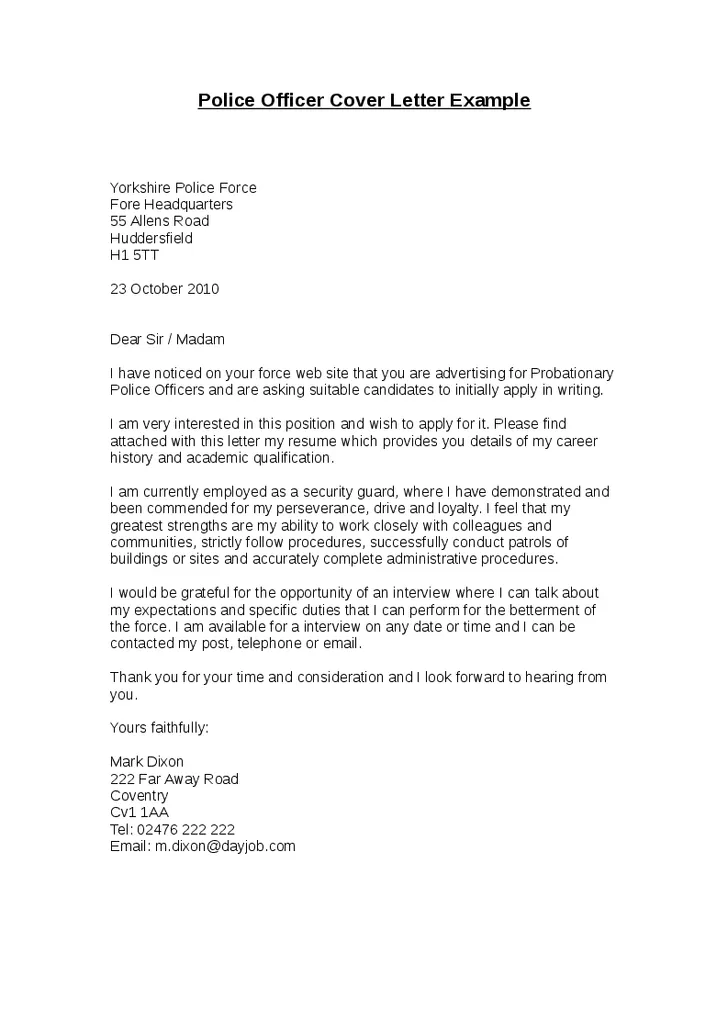
A strong police officer cover letter comprises several key components that work together to create a compelling and professional document. These include the header and contact information, a professional greeting, a compelling opening, a section highlighting your qualifications, a demonstration of your suitability for the role, and a strong closing. Each component plays a specific role in conveying your qualifications, expressing your interest, and encouraging the hiring manager to read your resume and consider your application. The content must be relevant, well-written, and tailored to the specific police department and job you’re applying for. The overall tone should be professional and enthusiastic, showcasing your personality while maintaining a formal and respectful approach. Carefully crafted components will demonstrate your understanding of the application requirements and your commitment to the law enforcement field.
Header and Contact Information
The header of your police officer cover letter should begin with your contact information. This includes your full name, address, phone number, and professional email address. Make sure your email address sounds professional. Avoid using nicknames or informal language. Below your contact details, you should include the date and the hiring manager’s contact information, if you know it. This typically includes their name, title, and the police department’s address. If you are unsure of the hiring manager’s name, research the department’s website or call and ask. It shows you’ve taken the initiative to find this information. Using the correct name shows that you’ve done your research. A well-formatted header is the first impression you make. See the image above.
Applicant’s Contact Details
At the top left or top center of your cover letter, provide your contact details. This section should clearly state your full name, current address, phone number, and professional email address. Accuracy is essential here. Ensure all the information is up-to-date and correct, including your address. Using a professional email address is crucial; it should include your name and avoid any unprofessional phrasing or nicknames. This information is essential for the hiring manager to contact you for an interview or to request additional information. Ensure the phone number you provide is one where you can be easily reached and have a professional voicemail greeting ready.
Hiring Manager’s Contact Details
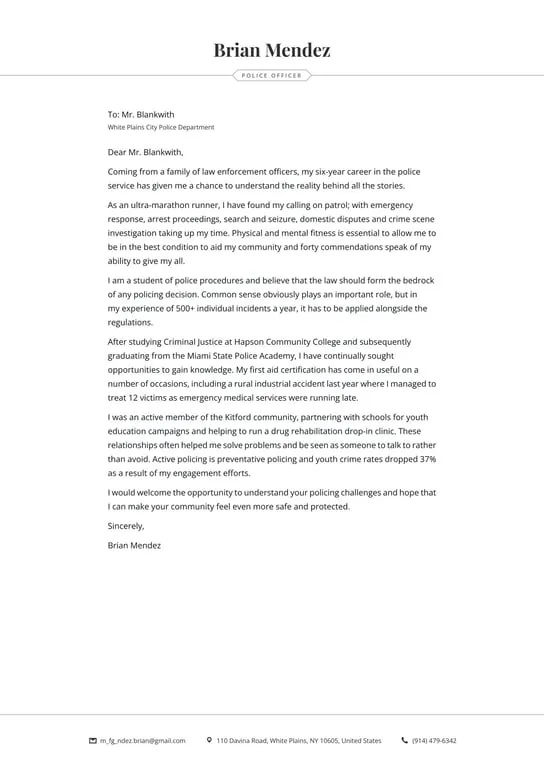
Directly below your contact information, or at the top right, include the hiring manager’s details. This demonstrates your attention to detail and your initiative in researching the police department. If you know the hiring manager’s name, use it. Otherwise, you may address the letter to the ‘Hiring Manager’ or ‘Recruitment Department’. Always include the police department’s address, which can often be found on the department’s website or job posting. Providing accurate contact information is critical for demonstrating professionalism. By addressing your letter to a specific person (when possible), you show that you’ve taken the time to learn about the department, which is a positive step in the hiring process.
Professional Greeting
The salutation sets the tone for your cover letter. If you know the hiring manager’s name, use it: ‘Dear Mr./Ms. [Last Name]’. If you don’t know the hiring manager’s name, use a professional greeting such as ‘Dear Hiring Manager’ or ‘Dear Recruitment Team’. Avoid generic greetings like ‘To Whom It May Concern’, as they can make your application seem impersonal. The greeting should be formal and respectful, setting a tone that reflects the professional standards of law enforcement. A well-chosen salutation immediately signals that you understand the importance of professional communication. Using the correct title and name, or the correct department if you don’t know the name, shows you have done your homework and that you care about the details.
Crafting a Compelling Opening
Your opening paragraph is your first opportunity to capture the reader’s attention. Start with a strong statement of purpose. Immediately state the position you are applying for and where you saw the job posting. Then, briefly state why you are interested in the police officer role and what makes you a strong candidate. This could include your passion for law enforcement, a relevant skill, or a previous experience. Be concise and enthusiastic, and aim to convey a sense of excitement and dedication. Tailor the opening to the specific department, if possible, mentioning something specific that attracted you to their organization. The goal is to make the hiring manager want to read further. A great opening quickly establishes the reason for your letter, grabs the reader’s attention, and sets the tone for your entire application. It allows you to immediately express your interest and demonstrate that you have taken the time to personalize your message. A well-written opening increases the likelihood of a positive response, creating a strong base for the rest of your application.
Highlighting Your Qualifications
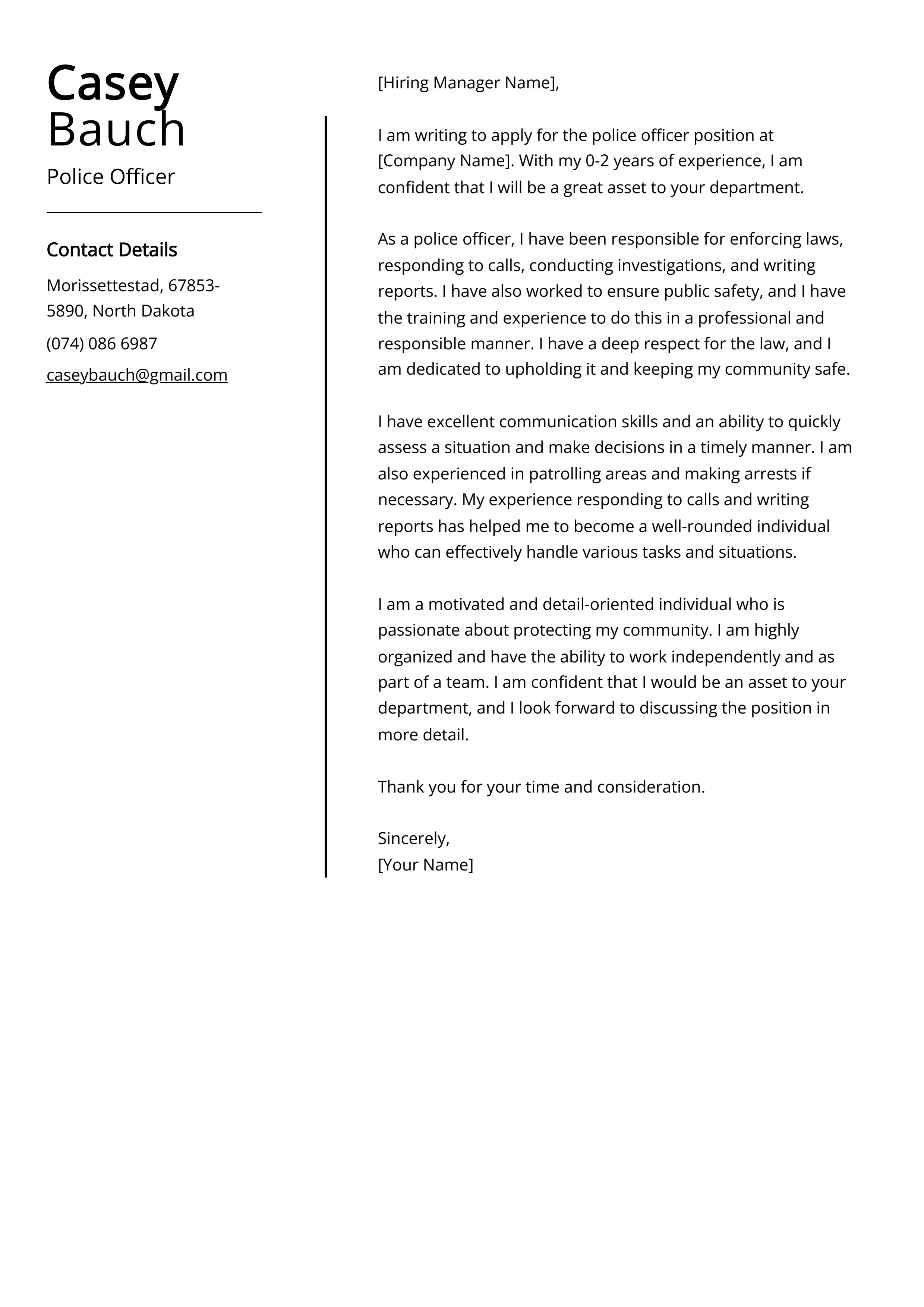
The body of your cover letter is where you demonstrate how your skills and experience align with the requirements of the police officer position. Select 2-3 key skills or experiences from your resume that directly relate to the job description. These might include communication skills, problem-solving abilities, experience with conflict resolution, or specific training such as firearms, first aid, or defensive tactics. Support each skill with a specific example from your past, using the STAR method (Situation, Task, Action, Result). Explain the situation, describe the task you had to accomplish, outline the actions you took, and highlight the positive result. This approach helps the hiring manager understand how you have applied your skills in real-world situations. By providing clear and concise examples, you not only demonstrate your capabilities but also reveal your ability to handle challenging situations. Use strong action verbs to describe your accomplishments and skills, and ensure that the examples you provide highlight your ability to work in law enforcement. This section proves your potential and makes the hiring manager understand that you are the right fit for the police force.
Emphasize Relevant Skills and Experience
When highlighting your skills and experience, focus on those that are most relevant to the police officer role. Law enforcement requires a variety of skills, so prioritize those that align with the job description and departmental needs. These may include effective communication (both verbal and written), critical thinking and problem-solving skills, the ability to remain calm under pressure, conflict resolution, and leadership abilities. Mention any prior law enforcement experience, military service, or relevant volunteer work. If you lack direct experience, emphasize transferable skills, such as teamwork, physical fitness, attention to detail, and the ability to follow procedures. When providing examples, make sure that each skill showcases your abilities, and provides a clear idea of how you can apply them in the role. Use specific examples to demonstrate how you have utilized these skills in the past, which is critical for making a compelling argument for why you’re a good fit for the role. Consider the unique skills you can bring to the position, and highlight them to the recruiter.
Showcase Achievements and Accomplishments
In addition to your skills, highlighting your achievements and accomplishments can greatly strengthen your cover letter. This is where you demonstrate that you have gone above and beyond, or that you have achieved tangible results. Quantify your achievements whenever possible. For example, instead of saying ‘Improved customer service,’ state ‘Improved customer satisfaction scores by 15%.’ If you have received any awards or recognitions, mention them, including the name of the award and the reason you were honored. If you have successfully resolved conflicts or de-escalated situations, give a brief description. Use the STAR method to detail how you achieved your accomplishments and the results of your work. Demonstrating your accomplishments shows that you are not only capable but also results-oriented, which is highly valued in law enforcement. This section offers the employer evidence that you can perform the duties of a police officer effectively. Focus on achievements that demonstrate leadership, problem-solving, or commitment to service, all of which are highly relevant to the role.
Demonstrating Your Suitability for the Role
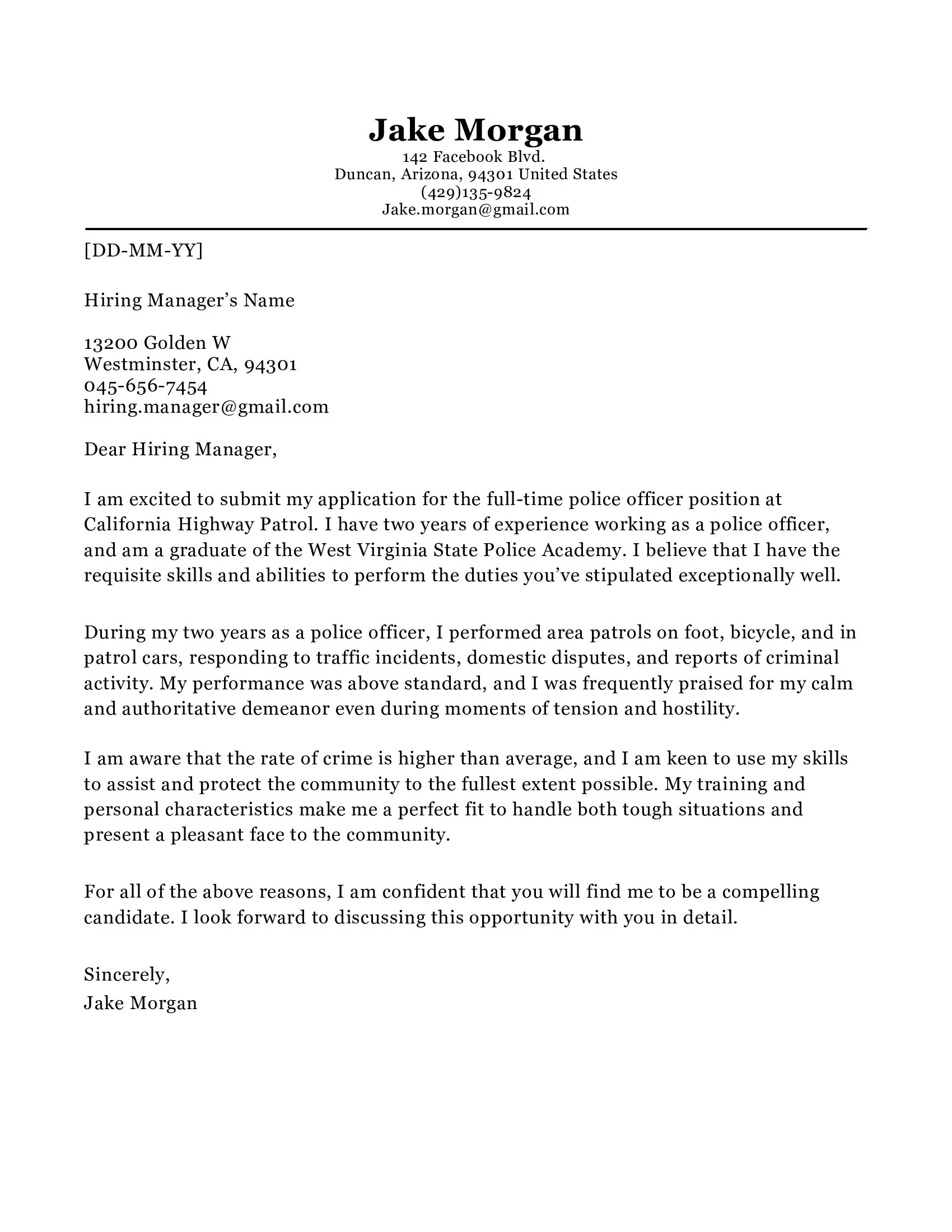
This is where you connect your qualifications with the specific requirements of the police officer role. After showcasing your skills and experience, explain how they make you a good fit for this particular police department. Refer back to the job description to identify the key requirements and demonstrate how your skills align. Clearly state your understanding of what the role entails and highlight why you are prepared to meet the demands of the job. You should show a commitment to the department’s values and mission, and explain how your personal values align with those of the department. Express your enthusiasm for law enforcement and your commitment to public service. This section is about more than just listing your skills; it’s about proving you understand the job and are genuinely interested in serving your community as a police officer. It’s your opportunity to convince the hiring manager that you are an ideal fit for their police department and why you are the perfect candidate.
Researching the Police Department
Before writing your cover letter, research the police department to which you are applying. This will show the hiring manager that you are genuinely interested in their organization. Look at their website, mission statement, and community involvement initiatives. Learn about the department’s values, goals, and any current initiatives they are undertaking. Tailor your cover letter to reflect your knowledge of the department and express your specific reasons for wanting to work there. Mention any community outreach programs or specialized units that interest you. Showing that you’ve researched the department and that you know what makes it special is a great way to show initiative and that you’re not just sending out generic applications. Showing that you have taken the time to learn about the department gives you a significant advantage over applicants who have not done the same. See the image above.
Aligning Your Skills with Department Needs
Once you’ve researched the police department, connect your skills to their specific needs and mission. Identify the qualities that the department values most, such as community engagement, crime prevention, or diversity. Then, highlight how your skills and experiences align with these priorities. For instance, if the department prioritizes community relations, you can mention your experience in community outreach or your strong communication skills. If the department is focused on crime reduction, showcase your problem-solving skills or analytical abilities. By demonstrating how you can contribute to the department’s goals, you show that you are not just a capable applicant, but an asset. This helps your cover letter resonate with the hiring manager. Using specific examples of how your skills align with the department’s goals demonstrates your understanding of the job and your ability to contribute to the organization’s success. The best cover letters demonstrate that you understand the requirements of the job and are ready to contribute to the mission of the department.
Expressing Your Enthusiasm
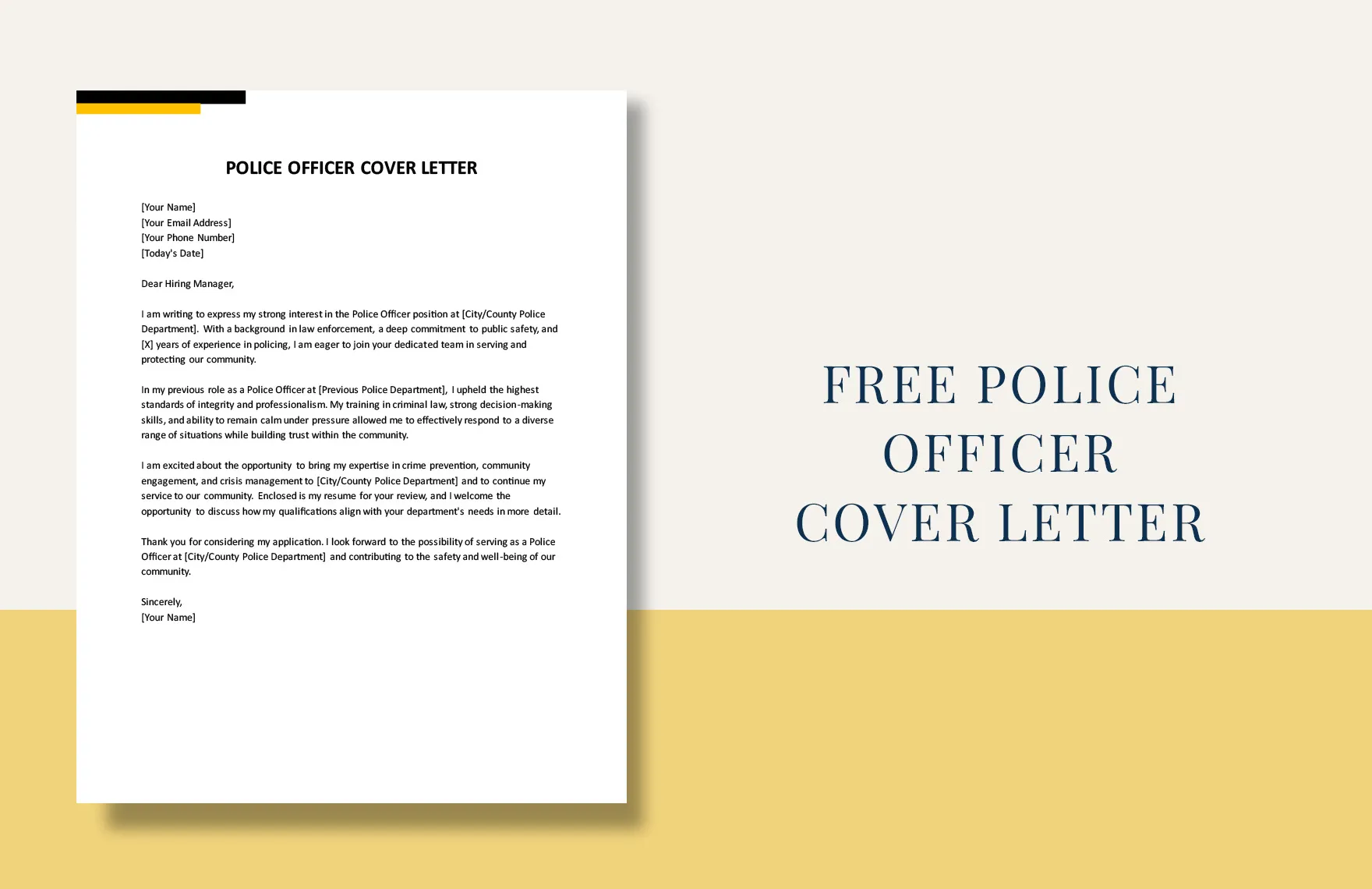
Throughout your cover letter, express your enthusiasm for the police officer position and the police department. Use positive and energetic language. Show that you are excited about the prospect of serving your community and contributing to the safety and well-being of others. Mention why you are interested in law enforcement. Talk about what motivates you and what you hope to achieve in the role. You might express admiration for the department’s values, community initiatives, or reputation. Enthusiasm makes you stand out from other candidates and demonstrates your passion and commitment. Enthusiasm is often the deciding factor in hiring, so be sure that your interest in the role comes across clearly. Demonstrate not just your interest but also your dedication to the values of the department, helping you to create a positive image of yourself that will impress the hiring team.
Writing a Strong Closing
Your closing paragraph should reiterate your interest in the position and thank the hiring manager for their time and consideration. Reiterate your enthusiasm, and briefly summarize your key qualifications. Express your desire for an interview and provide your contact information if it isn’t already included. If you are available for an interview, mention it. A strong closing leaves a lasting positive impression. Be sure to make it clear you’re ready to discuss your qualifications further. The conclusion provides a strong ending to the letter and reinforces your desire to contribute to the department and your confidence that you are the right fit. Including a call to action and a sincere expression of gratitude rounds out your cover letter, making it professional and memorable.
Expressing Gratitude
Always express your gratitude to the hiring manager for their time and consideration. Thank the hiring manager for reviewing your application and for considering you for the position. A simple phrase like ‘Thank you for your time and consideration’ shows that you appreciate their efforts. Gratitude shows respect and professionalism, making a positive impression and creating a favorable impression. It’s a simple yet effective way to show appreciation and can contribute to the overall impression of your letter. This shows respect for the hiring manager’s time and reinforces a positive and professional tone. This demonstrates respect for the time and effort that the hiring manager has invested in the application process.
Call to Action
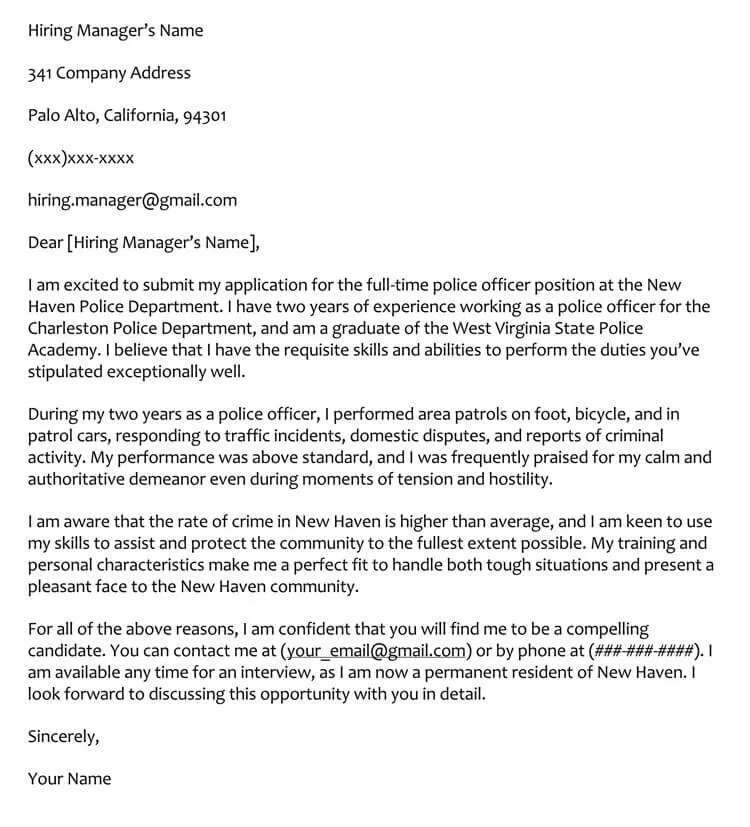
Include a clear call to action in your closing paragraph. Encourage the hiring manager to contact you for an interview. State your availability and your willingness to discuss your qualifications further. Using phrases like ‘I am eager to discuss my qualifications in an interview’ or ‘I am available at your earliest convenience’ will ensure your application is seen by the hiring team. Providing contact information again, in your closing paragraph, ensures that the hiring manager can reach you easily. The call to action encourages a positive response and helps to move your application forward in the hiring process. Including a call to action can significantly increase the chances that you will be contacted for an interview, showing that you are proactive and serious about the position.
Formatting and Proofreading
Proper formatting and proofreading are essential for creating a professional cover letter. The layout should be clean, easy to read, and visually appealing. Make sure the letter is free of grammatical errors, spelling mistakes, and typos. Poor formatting and errors can make you appear unprofessional and can negatively affect your chances of getting the job. Take the time to ensure your cover letter is polished and well-presented. Attention to detail is critical in law enforcement, and a carefully formatted, error-free cover letter demonstrates your commitment to these standards. Proper formatting ensures your cover letter is easy to read and makes a good first impression on the hiring manager. This highlights your professionalism and attention to detail, which are essential for the police officer role. See the image above.
Formatting for Readability
Ensure your cover letter is easy to read. Use a professional font like Times New Roman, Arial, or Calibri, and use a font size of 11 or 12 points. Set clear margins, and use single-spaced paragraphs with a double space between paragraphs. Use headings and subheadings to break up the text and make it easier to scan. Keep your paragraphs concise and to the point. Using bullet points to highlight skills and accomplishments can also improve readability. By following these guidelines, you can create a cover letter that is easy to read and helps the hiring manager quickly grasp your key qualifications. Proper formatting demonstrates attention to detail and ensures that the content of your letter is easily accessible, making a positive impression on the hiring manager. Easy-to-read cover letters help ensure that your key skills and experiences are noticed and appreciated.
Proofreading for Errors
Proofreading your cover letter is a crucial step in the writing process. Errors can undermine your credibility and signal a lack of attention to detail. Read your cover letter carefully and check for any grammatical errors, spelling mistakes, typos, and punctuation errors. Use a spell checker and grammar checker, but also read the letter aloud to catch any errors that may be missed. Ask someone else to proofread your letter as a fresh set of eyes can often spot errors you might miss. A clean, error-free cover letter shows that you pay attention to detail and are committed to producing high-quality work. See the image above.
Cover Letter Samples and Examples
Reviewing cover letter samples and examples can provide valuable guidance as you create your own. These samples can give you ideas for structure, formatting, and content. Use these samples as inspiration, but always tailor your letter to your own experience and the specific requirements of the police department. Make sure your cover letter is unique and represents you authentically. While cover letter samples can provide a useful starting point, it’s important to ensure your letter stands out and represents you and your specific qualifications. When using these samples, be sure to replace the information with your own details and tailor the content to the specific police department and the role you are applying for. A well-crafted, personalized cover letter is more likely to capture the attention of the hiring manager. See the image above.
Cover Letter Sample 1
This sample demonstrates a direct and concise approach, highlighting the candidate’s relevant skills and experience. It opens with a clear statement of purpose and quickly summarizes the candidate’s key qualifications, emphasizing their skills in communication, problem-solving, and teamwork. This format effectively shows the candidate’s suitability for the police officer role, and the writing style uses action verbs to strengthen the content. This type of sample is suitable for candidates who want to get straight to the point and demonstrate their qualifications with minimal introduction.
Cover Letter Sample 2
This sample provides a more detailed narrative of the candidate’s experiences and motivations. It begins with a compelling introduction that expresses the candidate’s enthusiasm for law enforcement. The sample then goes into detail about the candidate’s relevant experience, and how it aligns with the values and mission of the police department. The sample effectively uses the STAR method to illustrate achievements and highlights key skills, such as leadership and critical thinking. This is a good example of a sample for candidates who want to provide a detailed overview of their experience and passion for the police officer role.
Cover Letter Sample 3
This sample showcases a candidate who is new to law enforcement but has transferrable skills. It highlights relevant experiences from other fields, showcasing skills like adaptability, communication, and problem-solving. The sample emphasizes the candidate’s motivation and passion for law enforcement. It demonstrates how their background makes them well-suited for the police officer position. This is the type of sample you would use to demonstrate the candidate’s suitability for the role, even without direct law enforcement experience. The sample would focus on how the candidate’s experiences can be applied in the police force.
Tips for Success
To increase your chances of success, remember to tailor your cover letter to each specific job and police department. Customize the letter to reflect the unique requirements and values of each organization. Be honest and genuine in your writing, and don’t exaggerate your qualifications. Proofread your cover letter carefully, and ask someone else to review it as well. Following up with a phone call or email can demonstrate your continued interest. The combination of a well-crafted cover letter and these tips gives you the best chance of making a positive impression. Following up shows initiative and that you are serious about the role. Demonstrating your attention to detail, passion, and preparedness will set you apart from the crowd.
Tailoring Your Letter
Customize your cover letter for each application. Never send a generic cover letter. Each police department has its own values, mission, and requirements. Research the specific department to which you are applying. Highlight skills and experiences that are most relevant to the specific job description. Demonstrate how your qualifications align with the department’s needs and values. Tailoring your letter can significantly increase your chances of being selected for an interview. Demonstrating your knowledge of the department will show that you have done your research and are truly interested in the role.
Following Up After Submission
After submitting your cover letter and resume, it’s acceptable to follow up with the hiring manager. A follow-up email or phone call a week or two after the application deadline can show your continued interest. Keep your follow-up brief and polite. Reiterate your interest in the position and ask about the status of your application. If possible, ask if there are any other documents or information they might need. Avoid being overly persistent. If you don’t hear back, don’t be discouraged. Following up demonstrates your commitment and can provide you with valuable insight into the hiring process, which is essential for any candidate. Demonstrating your continued interest can make a strong impression and help you stand out among the applicants.
